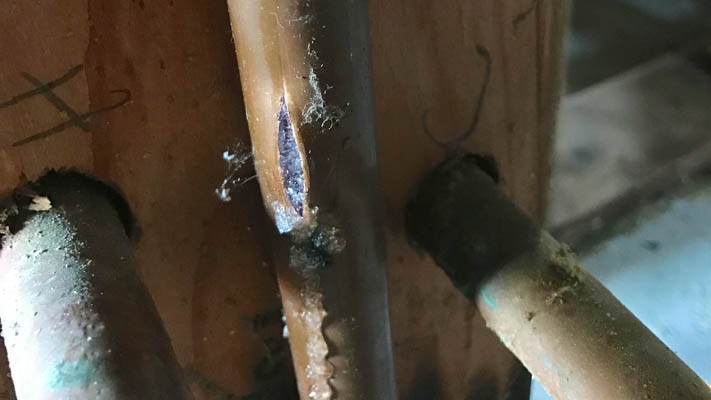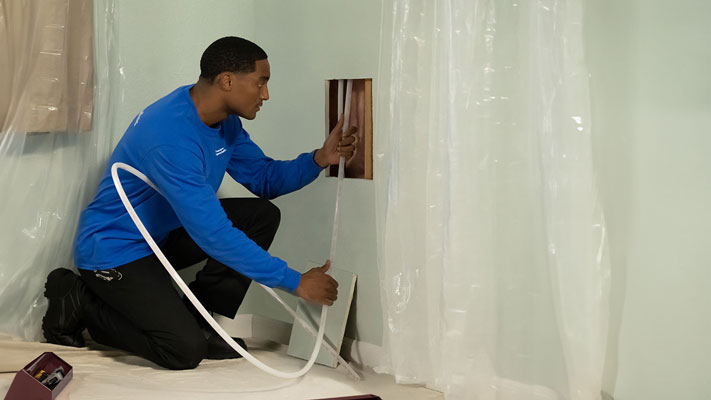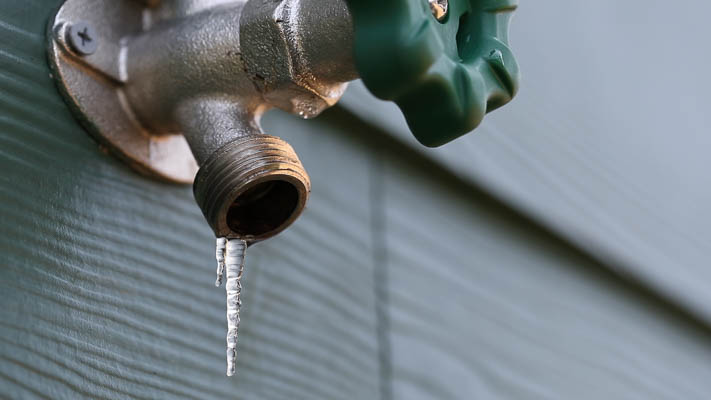What Temperature Do Pipes Freeze?
Pipes are most likely to freeze when temperatures reach 20°F or lower (although any water in your pipes can technically freeze below 32°F). However, factors such as wind chill, pipe location, and insulation levels can accelerate freezing even at slightly higher temperatures.
Uninsulated pipes in unheated areas, such as basements, crawl spaces, attics, and garages, are especially vulnerable. Exterior walls with little insulation also pose a risk, as cold air can seep in and quickly lower pipe temperatures. Even in homes built for colder climates, extreme cold snaps can overwhelm your home's pipes, leading to frozen plumbing.

Homeowners should be particularly aware when forecasts predict extended periods of sub-freezing temperatures. This became particularly notable during the unexpected Texas Freeze in 2021, when winter storms lasted for over two weeks. Monitoring the weather and taking action before a freeze sets in can help prevent costly damage. There are several easy signs to tell if your pipes are frozen.
Will Shutting Off Water Keep Pipes From Freezing?
Turning off your water supply can help minimize damage if your pipes do freeze, but it doesn't necessarily prevent freezing in the first place.
When pipes freeze, any remaining water inside expands, creating pressure that can cause the pipe to burst. If the water supply is shut off, there's less chance of high-pressure buildup, reducing the likelihood of a major leak when the pipes thaw.
Other options to help lower the chance of your pipes freezing include:
- Open all faucets slightly to allow a slow trickle of water. Moving water is less likely to freeze than standing water.
- Drain outdoor hose bibs and sprinkler systems before temperatures drop.
- If you suspect a pipe is frozen, try thawing it gradually with a hairdryer or heating pad—never use an open flame.
While shutting off the water can help manage the risks of frozen pipes, it's best used in combination with other preventative measures.
How to Keep Pipes From Freezing
Preventing frozen pipes requires a mix of insulation, heat retention, and proactive maintenance. Here are five of the most effective methods:
- Insulate Exposed Pipes: Use foam pipe insulation sleeves on pipes in unheated areas like crawl spaces, basements, and attics. For added protection, wrap pipes with heat tape or heat cables, which provide consistent warmth.
- Seal Off Drafts: Check for gaps or cracks around windows, doors, and exterior walls where cold air can seep in. Use caulk or spray foam to seal leaks around pipes leading outdoors.
- Keep the Heat On: Maintain an indoor temperature of at least 55°F (13°C), even if you're away. Open cabinet doors under sinks to let warm air circulate around plumbing.
- Let Faucets Drip: As mentioned earlier, allowing faucets to drip slightly keeps water moving, reducing the risk of freezing. Focus on faucets connected to pipes running through unheated areas.
- Drain Outdoor Plumbing: Disconnect garden hoses and shut off outdoor water supply lines. Drain sprinkler systems before winter sets in.
While these preventative measures can help protect your plumbing, they are not foolproof—especially in regions experiencing severe or prolonged freezing temperatures.
Repiping With Freeze-Resistant Materials
The most effective long-term solution is a full home repipe using freeze-resistant materials like PEX tubing. We have an article that breaks down the advantages of PEX during freezing temperatures.
Unlike rigid materials such as copper or CPVC, PEX has the flexibility to expand slightly when water freezes inside, significantly reducing the risk of bursting.

We can advise you on the best options for repiping with PEX tubing. During installation, we will ensure that PEX tubing is routed through areas that won't be exposed to freezing temperatures. We can also insulate the pipes as necessary to mitigate the risk of future freeze damage.
If your home has outdated or vulnerable plumbing, a repipe can provide you with the peace of mind that your home's fresh water lines are as protected as they can be from freezing temperatures. Contact us to have one of our local repipe consultants provide you with a consultation and quote, either in-home or remotely.
Get your free estimate today
With over 75,000 repipes completed, we've perfected our One-Stop Repipe™ for your home.
Receive a Free Plumbing Quote to Winterize Your Home
At Repipe Specialists, we've replaced plumbing damaged by freezing temperatures in homes across the USA using Uponor PEX-A tubing. Our customers consistently share positive feedback about their repipe experiences, often noting that we exceed expectations in:
- Speed: Our repipe crews typically complete a repipe in a day, returning on another day for wall patching.
- Convenience: Through our One-Stop Repipe™ Process, we handle everything from permits, to wall patching, to inspections.
- Cleanliness: Our crews are trained to protect your home while working (we cover all surfaces with protective sheeting), and to clean up fully at the end of each day.
- Peace of Mind: Repipe Specialists is a fully licensed plumber in every state we operate in, and we back all of our repipes with a lifetime warranty.
- Financing programs: To help take the sting out of unplanned repipe expenses, we offer several financing programs.
- Price: As a specialist that performs hundreds of repipes a week, we can deliver high quality repipes at a lower cost vs generalist plumbers. Our quotes typically range from $4,500 to $15,000 depending on the size and complexity of your project. We have an article that covers repipe cost factors in detail.
Schedule a free in-home consult, and one of our local repipe consultants will explain all your repipe options and provide you with a written, fixed-price quote. Beat the freeze and repipe with PEX tubing.

